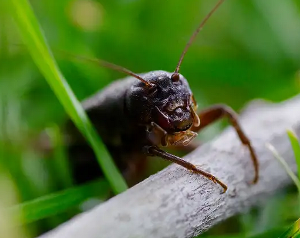 We are all concerned about the unprecedented pace of environmental change. Human activity (urbanization, climate change, introduced species, and more) seems poised to send us into a spiral of extinction. Can rapid evolution rescue populations from decline? For most of the last 150 years, we assumed that evolution was a historical process – it took place in the past and required an extremely long period of time. But, more recently, it has become clear that evolution is observable in real time, even in a matter of just a few months or years. In this Café we will consider what conditions are conducive to rapid evolution, alternate ways in which organisms might keep up with the pace of environmental change, and the implications of such changes for the origin and maintenance of biodiversity using examples from my own work on the sometimes bizarre mating habits of Hawaiian crickets and freshwater fish.
We are all concerned about the unprecedented pace of environmental change. Human activity (urbanization, climate change, introduced species, and more) seems poised to send us into a spiral of extinction. Can rapid evolution rescue populations from decline? For most of the last 150 years, we assumed that evolution was a historical process – it took place in the past and required an extremely long period of time. But, more recently, it has become clear that evolution is observable in real time, even in a matter of just a few months or years. In this Café we will consider what conditions are conducive to rapid evolution, alternate ways in which organisms might keep up with the pace of environmental change, and the implications of such changes for the origin and maintenance of biodiversity using examples from my own work on the sometimes bizarre mating habits of Hawaiian crickets and freshwater fish.
 Dr. Robin Tinghitella is an Assistant Professor in the Department of Biological Sciences at the University of Denver. She is a behavioral ecologist, wife, mother of three boys, and yoga enthusiast. She graduated from the University of Portland with a B.S. in Biology before earning her Ph.D. in Evolution, Ecology, and Organismal Biology at the University of California-Riverside, where she studied the evolution of animal communication and social interactions. She then completed postdoctoral positions at the University of Michigan and Michigan State University (MSU). At MSU she led a National Science Foundation funded project linking ecology graduate students with K-12 teachers and students to improve the scientists' teaching and communication skills. The experience ignited a long-lasting passion for science education and science communication. Dr. Tinghitella joined the University of Denver as a faculty member in the Department of Biological Sciences in 2013. Her animal behavior lab works to understand how rapidly changing environments alter animal communication, particularly interactions between males and females. Researchers in the lab use both insect and fish model systems and are supported by the National Science Foundation, the Society for the Study of Evolution, and the Animal Behavior Society. Her work has recently been featured in Newsweek, New Scientist, AmazeLab (USA Today), and HawaiiNewsNow, and she gave a TedX MileHigh Adventure talk in 2018.
Dr. Robin Tinghitella is an Assistant Professor in the Department of Biological Sciences at the University of Denver. She is a behavioral ecologist, wife, mother of three boys, and yoga enthusiast. She graduated from the University of Portland with a B.S. in Biology before earning her Ph.D. in Evolution, Ecology, and Organismal Biology at the University of California-Riverside, where she studied the evolution of animal communication and social interactions. She then completed postdoctoral positions at the University of Michigan and Michigan State University (MSU). At MSU she led a National Science Foundation funded project linking ecology graduate students with K-12 teachers and students to improve the scientists' teaching and communication skills. The experience ignited a long-lasting passion for science education and science communication. Dr. Tinghitella joined the University of Denver as a faculty member in the Department of Biological Sciences in 2013. Her animal behavior lab works to understand how rapidly changing environments alter animal communication, particularly interactions between males and females. Researchers in the lab use both insect and fish model systems and are supported by the National Science Foundation, the Society for the Study of Evolution, and the Animal Behavior Society. Her work has recently been featured in Newsweek, New Scientist, AmazeLab (USA Today), and HawaiiNewsNow, and she gave a TedX MileHigh Adventure talk in 2018.
 We are all concerned about the unprecedented pace of environmental change. Human activity (urbanization, climate change, introduced species, and more) seems poised to send us into a spiral of extinction. Can rapid evolution rescue populations from decline? For most of the last 150 years, we assumed that evolution was a historical process – it took place in the past and required an extremely long period of time. But, more recently, it has become clear that evolution is observable in real time, even in a matter of just a few months or years. In this Café we will consider what conditions are conducive to rapid evolution, alternate ways in which organisms might keep up with the pace of environmental change, and the implications of such changes for the origin and maintenance of biodiversity using examples from my own work on the sometimes bizarre mating habits of Hawaiian crickets and freshwater fish.
We are all concerned about the unprecedented pace of environmental change. Human activity (urbanization, climate change, introduced species, and more) seems poised to send us into a spiral of extinction. Can rapid evolution rescue populations from decline? For most of the last 150 years, we assumed that evolution was a historical process – it took place in the past and required an extremely long period of time. But, more recently, it has become clear that evolution is observable in real time, even in a matter of just a few months or years. In this Café we will consider what conditions are conducive to rapid evolution, alternate ways in which organisms might keep up with the pace of environmental change, and the implications of such changes for the origin and maintenance of biodiversity using examples from my own work on the sometimes bizarre mating habits of Hawaiian crickets and freshwater fish.

 Dr. Robin Tinghitella is an Assistant Professor in the Department of Biological Sciences at the University of Denver. She is a behavioral ecologist, wife, mother of three boys, and yoga enthusiast. She graduated from the University of Portland with a B.S. in Biology before earning her Ph.D. in Evolution, Ecology, and Organismal Biology at the University of California-Riverside, where she studied the evolution of animal communication and social interactions. She then completed postdoctoral positions at the University of Michigan and Michigan State University (MSU). At MSU she led a National Science Foundation funded project linking ecology graduate students with K-12 teachers and students to improve the scientists' teaching and communication skills. The experience ignited a long-lasting passion for science education and science communication. Dr. Tinghitella joined the University of Denver as a faculty member in the Department of Biological Sciences in 2013. Her animal behavior lab works to understand how rapidly changing environments alter animal communication, particularly interactions between males and females. Researchers in the lab use both insect and fish model systems and are supported by the National Science Foundation, the Society for the Study of Evolution, and the Animal Behavior Society. Her work has recently been featured in
Dr. Robin Tinghitella is an Assistant Professor in the Department of Biological Sciences at the University of Denver. She is a behavioral ecologist, wife, mother of three boys, and yoga enthusiast. She graduated from the University of Portland with a B.S. in Biology before earning her Ph.D. in Evolution, Ecology, and Organismal Biology at the University of California-Riverside, where she studied the evolution of animal communication and social interactions. She then completed postdoctoral positions at the University of Michigan and Michigan State University (MSU). At MSU she led a National Science Foundation funded project linking ecology graduate students with K-12 teachers and students to improve the scientists' teaching and communication skills. The experience ignited a long-lasting passion for science education and science communication. Dr. Tinghitella joined the University of Denver as a faculty member in the Department of Biological Sciences in 2013. Her animal behavior lab works to understand how rapidly changing environments alter animal communication, particularly interactions between males and females. Researchers in the lab use both insect and fish model systems and are supported by the National Science Foundation, the Society for the Study of Evolution, and the Animal Behavior Society. Her work has recently been featured in